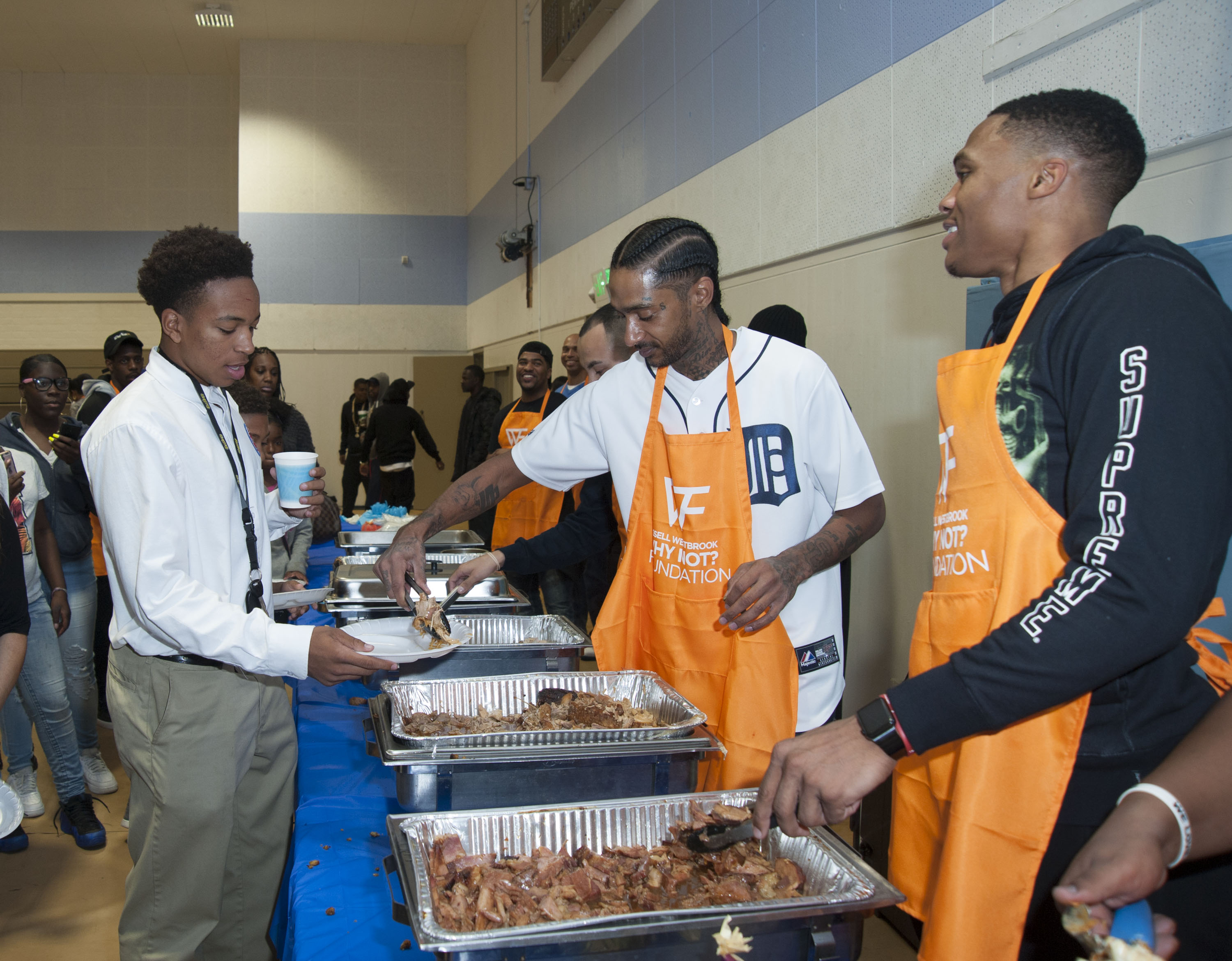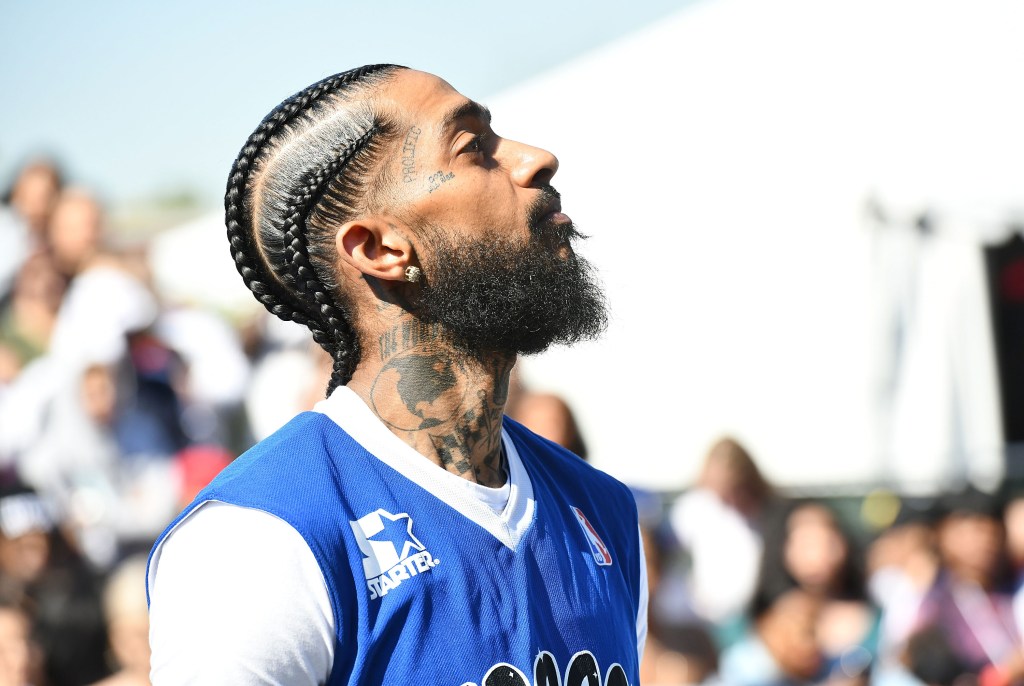Craig Batiste was asleep in his South Los Angeles home one night in 2016 when his phone started ringing. Having grown up in a community where street violence is a part of everyday life, Batiste was conditioned to fear the worst.
“Any type of phone call at two or three in the morning is never a good call,” he said when we spoke over the phone recently. But as it turns out, the calls were coming from customers who wanted to order his signature fries after the rapper Nipsey Hussle shared one of Batiste’s Instagram posts with his million-plus followers. After Batiste’s friends told him to check his Instagram, he realized what had happened. “I was like ‘Oh shit. He posted it. He posted it.’ I was awake then!”
Videos by VICE
At the time, Batiste was running his business, Mr. Fries Man, out of his two-bedroom home where he lived with his then-fiancée and their three kids. The concept is simple: Cook the fries until they’re golden and crispy, then smother them in indulgent toppings like Buffalo ranch chicken, or his best-selling lemon garlic shrimp.
Earlier that day, Nipsey had called Batiste to place a large order for a show he was playing that night. “My wife picked up the phone and said ‘It’s Nipsey.’ I thought it was a joke. But later on that night, his bodyguard pulled up and took the fries to the show. But I thought, ‘He ain’t gonna post the fries. There’s no way.’” Batiste recalls that after that day, his business took off. “I was doing it at the house at that time, and it was like, ‘Whoa. Hold on. I gotta figure some shit out. I gotta find a better system.’ It was getting out of hand in a good way.” Today, Mr. Fries Man operates out of a brick and mortar shop in Gardena, and to this day, Batiste still has customers tell him that they first discovered his fries through Nipsey Hussle’s Instagram page.
When Nipsey Hussle was fatally shot on March 31 in broad daylight outside of his Marathon clothing store in LA’s Crenshaw neighborhood, the 33-year-old rapper’s death sent shockwaves through the hip-hop community and the entertainment world at large. But it was perhaps felt most deeply in his own community, where he had become an ambassador, an activist, a philanthropist and an entrepreneur. Aside from investing his own money in revitalizing Crenshaw—he bought a local fish market, a barbershop, and a Fatburger—Nipsey also helped uplift local business owners by preaching the importance of ownership.
“He taught us how, if you’re going to hang on a block, what’s wrong with finding out the logistics and owning the block?,” says Keith Garrett of food truck All Flavour No Grease. “He would always say, ‘Why rent for so many years only to die and have no equity in it?’ He took renting out of your mind.”
Garrett started AFNG in 2014, selling tacos and quesadillas from the front yard of his Watts home. After Nipsey tasted his food, the two men “meshed,” and spent hours talking about their visions for the future. Garrett now operates multiple food trucks under the AFNG banner, and hosts ultra popular pop-ups throughout LA. He says it was Nipsey who helped him unlock his inner entrepreneur.
“He could’ve called anybody in the world. He owns the Fatburger right around the corner. So for him to call local urban food trucks that make all these different types of cuisine, it’s priceless.”
“He always told me to not only dream big, but to chase big,” Garrett says. “When he embedded that in me three or four years ago, I didn’t understand what he meant. It was a lot for me to grasp. But over a period of time, he showed me how the world is like Monopoly, and if you’re going to hang on Boardwalk or Park Place, let’s figure out how to buy it so it’s ours.”
Batiste and Garrett are prominent figures in South LA’s once-underground food scene, alongside Jermelle Henderson of Taco Mell, Inc., and Grubby Johnson of The Bleu Kitchen. Together, they dubbed their “brotherhood,” as Batiste calls it, The Foodminati.
“It’s the first thing that I’ve been a part of that’s all Black men, and we all own businesses, and we all get along, and we’re all positive, even though we all come from different sections of the city,” he says. “We were just like, ‘Let’s take over. Let’s do something positive in our community. Let’s show people that you don’t have to go to the NFL to be a successful Black person. You don’t have to be a rapper. You can open up a business.”
Whenever Nipsey would throw one of his legendary parties in the parking lot outside the Marathon store, he called on the Foodminati to supply the food, which gave the men invaluable exposure in South LA and beyond. “These events had over 1,000 people. Just to get that call was humbling,” Garrett says. “He could’ve called anybody in the world. He owns the Fatburger right around the corner. So for him to call local urban food trucks that make all these different types of cuisine, it’s priceless.”
Both Batiste and Garrett come from different neighborhoods in South LA, and credit Nipsey for helping to unify communities that have long been separated by the invisible walls of gang culture.
“There are so many different gangs in California and I never thought in my lifetime that we’d ever come together and shake hands and actually interact amongst each other and I was born and raised into it,” Batiste says. “That was the impact he had. He was always positive. He repped where he was from but he was always positive.”

Batiste explains that even when Nipsey’s star started to rise, he never lost touch with his South LA roots. “He was a rapper who made it, but he still messed with us. I came up the same way; he just took off before a lot of us, and then he showed us the way,” Batiste says. “He was a leader.”
“He told us that no matter what you’re doing, nothing’s going to get easier. Some days are going to be easy but some days there’ll be a brick wall in front of you, and you’re going to have to knock that down and keep pushing.”
More
From VICE
-

(Photo by Francesco Castaldo/Pacific Press/LightRocket via Getty Images) -

M Scott Brauer/Bloomberg via Getty Images -

Firefly Aerospace/YouTube -

Justin Paget / Getty Images
